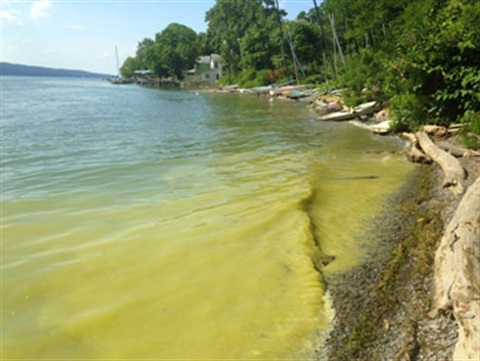HABs Alert Harmful Algal Blooms in Tompkins County
Published on July 11, 2025

(Ithaca, N.Y. July 11, 2025) – Tompkins County Whole Health is alerting the community that cyanobacterial blooms, also known as Harmful Algal Blooms (HABs) | Tompkins County, have recently been reported in portions of Cayuga Lake and monitoring is continuing.
These blooms may vary in size and be confined to specific areas of the shoreline and bays, though they can form in open waters as well. Blooms can be tested to determine if toxins exist. TCWH tests samples at regulated beaches when blooms are reported. These beaches include: Jennings Pond, Myers Point, and Ithaca Yacht Club, Ithaca Zen Center, and Comstock Camp. If a bloom is sighted, the beach is closed, and information is posted, a sample is collected, and the beach reopens once a negative result is received.
People recreating in and on the water should be aware of the potential for HABs in any waterbody they consider using. Because it is hard to tell a HAB from non-harmful algal blooms, it is best to avoid swimming, boating, otherwise recreating in, or drinking water with a bloom. Areas where blooms are not observed can continue to be used for recreational use.
Doug Barnes, Senior Environmental Health Specialist states, “Blooms are often transient, typically lasting only a few hours. However, without testing, it is difficult to know if an area of water is safe to use. During these summer months, we urge the community to be aware, know what to look for, and avoid the area if it appears discolored or has an unpleasant odor.”
Tompkins County Whole Health encourages residents and visitors to beware of HABs. These blooms can occur in any calm body of water and may produce toxins that are harmful to people and animals.
- Do not drink the water and avoid contact with the water if it appears discolored or has an unpleasant odor.
- Do not allow pets to swim in water where suspicious cyanobacteria blooms are present.
- Hot weather and intense rain and runoff events can lead to an increase in the presence of HABs.
HABs can also be present in smaller ponds. Residents who have private ponds should monitor their ponds for signs of blooms and avoid contact. Residents may contact Soil and Water Conservation District (SWCD) at 607-257-2340 for guidance on pond management and a possible site visit to view the suspicious bloom. If a private resident is interested in testing a bloom, please contact the Community Science Institute (607-257-6606) to determine testing options and fees.
Identifying HABs:
If contact occurs with suspicious HABs,
- Rinse thoroughly with clean water to remove cyanobacteria.
- Rinse dogs that may have gone in the water, so they do not lick their coats. Dry dogs thoroughly. If a dog drinks any of the water, contact veterinarian for assistance. Click here for more information on the risks HABs present to dogs: dec.ny.gov/docs/water_pdf/habspets.pdf
- Stop using the water and seek medical attention immediately if symptoms such as vomiting, nausea, diarrhea, skin, eye or throat irritation, allergic reactions or breathing difficulties occur after drinking or having contact with blooms or untreated surface water.
The Community Science Institute (CSI), Cayuga Lake Watershed Network, and Discover Cayuga Lake lead a volunteer program to monitor the Cayuga Lake shoreline for HABs during the summer months. To stay alert to blooms occurring on Cayuga Lake, check the Cayuga Lake HABs Interactive Map on CSI’s website at: database.communityscience.org/hab
To report a HAB:
Learn more about HABs online at: Harmful Algal Blooms (HABs) | Tompkins County
Tompkins County Whole Health: envisioning a future where every person in Tompkins County can achieve wellness. Find us online at TompkinsCountyNY.gov/health, and follow us on Facebook at Facebook.com/TompkinsWholeHealth and on Twitter and Instagram at @TCWholeHealth. Sign up to receive Whole Health updates or other county announcements via email or text.
- end -